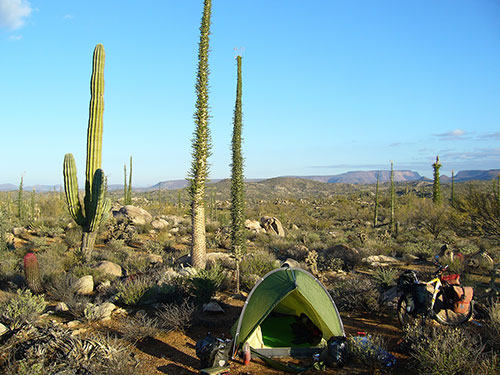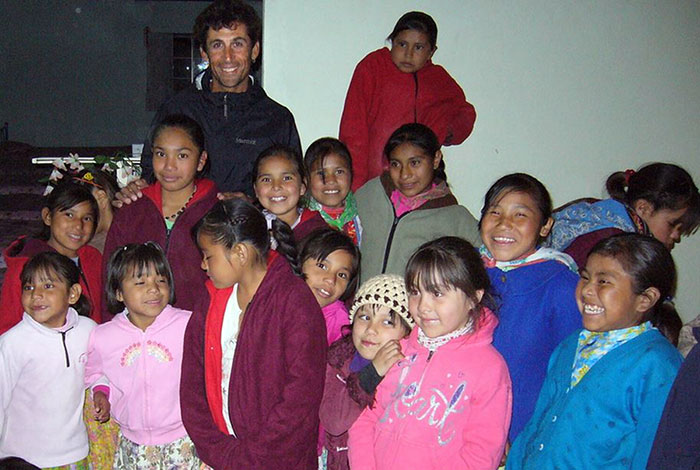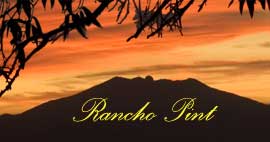|
By John Pint
 Close to 300 people gathered
at celebrated Casa
Clavigero in Guadalajara, Mexico, the evening of April 23, 2015 for the
first presentation of Salva
Rodríguez's latest book on his tour of the world by bicycle. The
Spanish cyclist set out from his home town of Granada in 2006 and
since then has pedaled about 150,000 kilometers through Africa, Asia
and most recently, America (the continent, of course). “I have only
4,000 kilometers more to go and I'll be back home,” he told his
audience, perhaps a bit wistfully. Close to 300 people gathered
at celebrated Casa
Clavigero in Guadalajara, Mexico, the evening of April 23, 2015 for the
first presentation of Salva
Rodríguez's latest book on his tour of the world by bicycle. The
Spanish cyclist set out from his home town of Granada in 2006 and
since then has pedaled about 150,000 kilometers through Africa, Asia
and most recently, America (the continent, of course). “I have only
4,000 kilometers more to go and I'll be back home,” he told his
audience, perhaps a bit wistfully.
As the tall, thin bicycle rider described his experiences crossing
America from Prudhoe Bay in Alaska to Ushuaia, Argentina (“The
Southernmost city in the world”), it became clear to everyone in
the house that the people he met along the way had affected him
deeply. Perhaps the one who affected him most was the woman sitting
next to him, his wife, tapatía Lorelí Padilla, also
a
cyclist, whom he met during his 42,000 kilometer ride through the
Americas and to whom his new book, “America, Around the World on a
Bicycle, a Storybook Voyage” is dedicated.

I was impressed that the gangly Spaniard said relatively little
during his talk about technical matters like kilometers per day,
bicycle maintenance or the gear he uses for camping in the most
outlandishly varied circumstances imaginable.
No, this was principally a talk about people. For example, there was
Jack, one of several adventurers he met while shooting rapids in
Montana. “This young man,” said Salva, “kept asking me
questions: How do you do this? How do you do that? Finally, I said,
'Listen, Jack, you're wearing me out. Why don't you stop asking me
all these questions and just come along with me for a while—you'll
find all the answers yourself.'”
To Salva's surprise, Jack replied: “Give me one day.” And 24
hours later they were on the road together for over a week.
Then there was the time he found himself in the middle of a huge
stretch of Colombia which is really isolated. “There are no
cities,” he told his audience. “La Globalización has
not
yet reached the place. There are no roads marked on the map and you
need a compass to get around. The only way to get food is to knock on
someone's door. And if no one is home, you just have to wait.”

This is the lonesome place where, one day, Salva found himself with a
broken wheel and no spare, “600 kilometers from the nearest paved
road.” Here is where he knocked on the door of a man named William
who had just come back from rescuing a cow. William took one look at
Salva's bicycle and said, “My son's bike has the same size
wheel—let me talk to him about this.” After a night of
reflection, the father and son decided Salva's need was much greater
than theirs. “You can take my son's wheel,” said the father.
“I will pay you for it,” said Salva.
“As for payment, we shall see,” replied the father.
At the moment of Salva's departure, however, the father absolutely
refused to take money. “What is the price of a liter of water when
you are dying of thirst in the desert?” asked Salva. “That wheel
meant everything to me and I would have paid anything for it, but
that man wouldn't take a centavo. He was so typical
of the
people I met in Latin America, especially Mexico, people with a
special kind of spirit I could not find anywhere else in the world.
Truly, they have greatness in their hearts.”
At the end of the talk, someone asked Salva if he had problems
entering the USA by bicycle from Canada, noting many rumors about how
difficult it is to cross this border.
“It was a snap,” said Salva with a broad smile. “The guard
turned out to be a Hispanic, and a cyclist, to boot.” He added that
he entered the USA with strong prejudices against Americans,
expecting to be treated badly. “But when I actually cycled through
the country, I found these things simply weren't true. I found people
there kind, generous and helpful...and I was never once mugged.”
América Un Viaje de Cuento, is written in Spanish and has 325 pages
plus 34 color photos. It describes Salva Rodriguez's adventures and
reflections while passing through 18 countries of America. Below is a
short excerpt which I have translated into English. This passage
reminds me of an episode in “Seven Pillars of Wisdom” by another
strong-willed adventurer, T.E. Lawrence. In order to deliver a gold
payment to to a Bedouin chief, Lawrence had to get his heavily laden
camel up a mountain covered with ice-encrusted snow. He did it by
walking ahead of the camel and breaking the ice with his fists. Then
he had to get behind the animal and push it uphill a few meters. When
he reached the top, he looked back to see the trail he had forged: a
red ribbon of blood from his own hands.
In the passage below, Salva is in Rarámuri
territory in northern
Mexico, which, these days, is also Narco territory. He is trying to
get from Tubares, Chihuahua, located 440 kilometers north of
Mazatlán, to a place called Piedras Verdes, site of a large gold
mine called El Sauzal, and is faced with a sandy brecha
up a
very steep slope:
Excerpt
from “America” by Salva Rodríguez:
“At
the foot of the hill, I
try pedaling slowly to get traction on the sand while avoiding the
rocks in the so-called road...
Impossible.
It's simply too
steep. So I walk. And it takes over two hours to do the next four
kilometers. I only need the fingers of one hand to count how many
times I've been in a situation like this, trying to climb a veritable
toboggan slide with a loaded bicycle weighing sixty kilos and my feet
slipping on the gravel. I grab the handlebars with bent elbows and
knees and then suddenly unbend them while taking one step forward.
And in this way I manage to advance 30 centimeters (a foot).
Instantly, I clamp down on the brakes so I won't lose those precious
centimeters I've gained. Then, knees and elbows bent again, I do
another push and that's how it goes for four kilometers...
Despite
my best efforts, the
brake pads slip frequently. It's always the same pattern: one brake
slips and then the other and then I fall and then the bicycle comes
down on top of me. If I don't get a bruise on my knee, I get a cut.
And the miners driving by no longer stop to offer me a ride. By now
they know I'm so stubborn I will only get on a truck if my legs are
cut off—something I'm beginning to suspect might just happen,
considering how much this bicycle is beating me up.
I
stop a few times to rest
because I'm worn out and my right elbow and knee hurt like hell.
There are sections of this slope which are so steep that advancing
ten meters takes me ten minutes and leaves me gasping for air. So
it's entirely thanks to fury and yells that I manage to push the bike
a few more centimeters.
I
could take longer rests—I
am in no hurry and nobody is waiting for me—but to make things even
worse than they are, it's in this lonely corner of Chihuahua that I
make my first acquaintance with some delightful creatures with whom I
am going to form a close relationship in Latin America. They are
called jejenes here, gnats in English. They are
very small
black flies that leave a tiny bubble of blood on top of their bite
and if they really sink their teeth into you, a little stream of
blood flows out of it and if I scratch the bite, I can't stop
scratching for three or four days.
Fortunately,
the Mexican
jejenes only land on my legs when I
stop, but the ones I found
in southern Peru are so aggressive that they manage to bite me even
while I am pedaling. I notice that it takes these Mexican gnats three
minutes to discover me, so I restrict my rest stops to two minutes
maximum: just enough to avoid the gnats, but not enough to catch my
breath.
Legs
trembling, huffing and
puffing, I reach the mining camp which I have been looking at from
below for the last two hours. I greet the miners (at least I think I
did) and sit down in the shade. The boss comes over and offers me a
cold Coca-cola, but I say no, gracias. I haven't
even the
strength to drink—I just need to rest. After a while, I regain
consciousness in a sense and drink some water. The boss, worried
about me, asks if I want to take a shower. A real hot shower! There
is absolutely nothing better than a hot shower, but today not even
that brings me back. The town of Piedras Verdes is still six
kilometers further up the mountain, but now that I've cooled down, I
know I couldn't even do another 300 meters. I ask if I can stay the
night. Of course you can, they say, and eat with us too: all the men
at the Sauzal mine want to meet this idiot of a gachupín
(disparaging term for Spaniard) who prefers to push his bike up a
hellish hill instead of accepting a ride...”
Salva Rodríguez' website is unviajedecuento.weebly.com
and you can
order his books from salva2africa@yahoo.es.

Salva Rodríguez with Rarámuri
children in northern Mexico, after giving them a talk. FOR MORE ON SALVA'S ADVENTURES, CHECK OUT "AROUND THE WORLD ON A BICYCLE"
|

